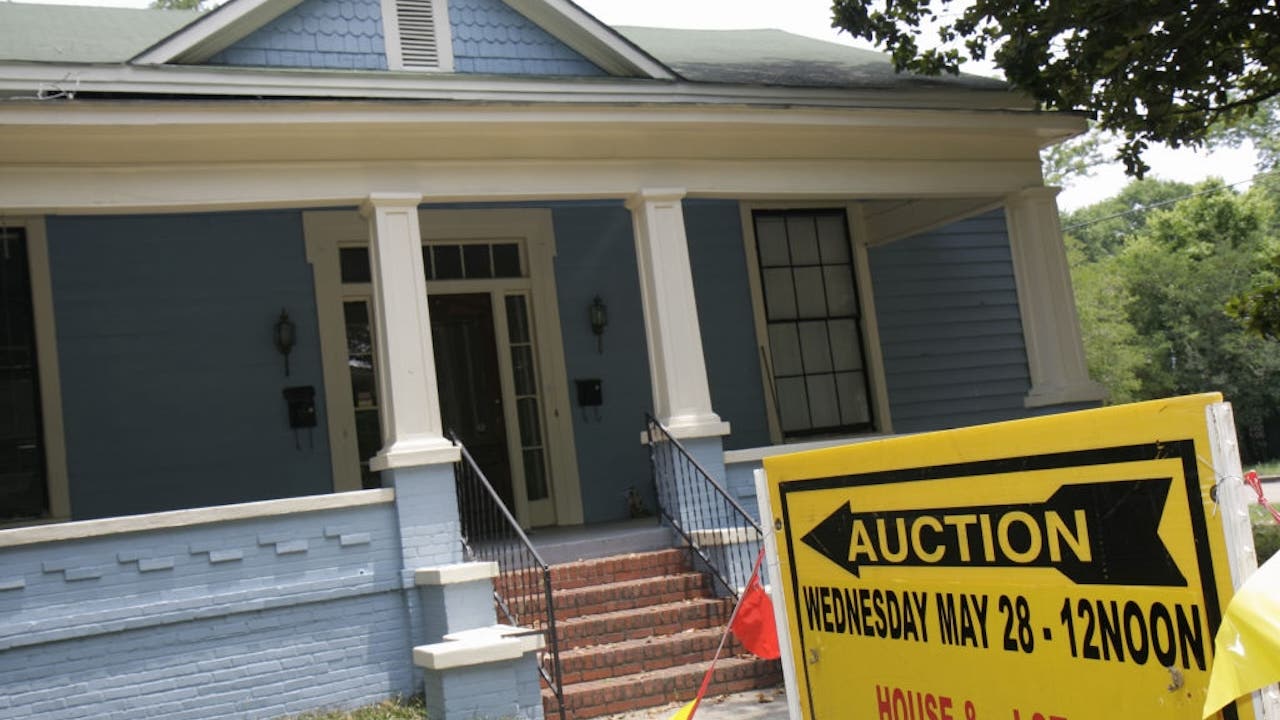How to buy a house at auction




Key takeaways
- Homes may be auctioned off if they are being foreclosed or the owner is in financial distress.
- Bidders could potentially score a great deal, but there are also risks involved.
- Real estate auctions typically require cash on-hand and do not accept financing.
Homes listed for sale online aren’t the only available properties out there. Sometimes, homes are auctioned off due to foreclosure or other reasons. Buyers and investors can capitalize on these auction opportunities to purchase a home, sometimes at a significant discount. But they aren’t as easy to find as regular listings, and inexperience can be a barrier to entry. Here’s what to know about buying a house at auction.
Why are houses sold at auctions?
A home can be auctioned for several reasons, but in many cases, it’s because the existing owner of the property is experiencing financial trouble. The most common reasons for an auction sale include foreclosure and failure to pay property taxes.
“When a homeowner doesn’t make regular payments to the lender, sometimes the lender has no choice but to foreclose on the property,” says Colby Hager, owner of Capstone Homebuyers in San Antonio, Texas. “When this happens, the property is often put up for auction.”
The foreclosure rate in the U.S. peaked in 2010 and steadily decreased due to a strong economy and job market. That trend continued through 2020, when foreclosure activity came to a halt as a result of the pandemic. Foreclosure levels have since risen some, but they’re down 2 percent since last year, according to ATTOM Data Solutions’ most recent U.S. Foreclosure Market Report.
Types of real estate auctions
There are various types of auctions, with rules and regulations surrounding participation. A real estate auction can be classified as one of three types: an absolute auction, a minimum bid auction or a reserve auction.
- Absolute auction: This is a standard real estate auction, where each bid must be higher than the last — the auction ends when no participant bids higher than the most recent bid. The highest bidder is the one who acquires the property. Unlike other types of auctions, absolute auctions have no minimum bid requirement. This fact can work to a buyer’s advantage: A buyer might be the sole participant, for example, and can walk away with a steal.
- Minimum bid auction: As the name indicates, this type of auction generally has a minimum bid amount that is the lowest price the seller will accept. If the minimum isn’t met, the house remains unsold. “Typically, that amount is the debt owed to the entity that put the property up for auction, such as the tax debt owed or value of the loan on the property,” says John Castle, a real estate investment agent with Sutton Group in Ottawa, Ontario, Canada. The amount usually also accounts for the auctioneer’s commission and the transfer tax (if taking place in a transfer tax state).
-
Reserve auction: A reserve auction is a combination of absolute and minimum bid, with a reserve price (minimum bid) set. If none of the bids meet that minimum, the seller can withdraw the property from auction.
Types of bids
There are two types of bids at real estate auctions: open, meaning bid amounts are out in the open and known to all participants, and blind, meaning bid amounts are kept secret. “In an open auction, every bidder knows what others are bidding,” Castle says. “In a blind auction, the bidders don’t know.”
Open-bid auctions can be conducted online or in person. With the latter, bidding often occurs at an auction house, courthouse or city hall. Before participating, bidders must agree to the terms of the auction by completing the requisite paperwork or accepting an end-user license agreement, Castle says. A deposit is often required, and bidders must also verify their identity and demonstrate their authority over any legal entity (such as an LLC) that will take the title of the property, if applicable.
In a blind-bid auction, by contrast, a deposit is commonly submitted with the bid along with an agreement accepting the auction’s terms — all of which are usually enclosed in a sealed envelope. The bidder’s identification might be given to the party accepting the bid.
How to buy a house at auction, in 5 steps
Step 1: Weigh the pros and cons
The main benefit of purchasing a home at auction is the ability to buy a property for below market value. Put another way: You might be able to score a sweet bargain.
There are risks too, though, says Suzanne Hollander, an attorney and real estate professor at Florida International University in Miami. These include:
- You usually can’t have the property professionally inspected, which could lead to surprises like physical damage and structural problems.
- It’s your responsibility to conduct the necessary due diligence. This includes investigating title issues and outstanding liens.
- You generally must pay all-cash; financed funds are almost never accepted. And if you are able to finance the property with a mortgage, your lender might not release the funds until you complete any needed repairs.
- You must pay for all back taxes in many jurisdictions. In addition, if it’s part of a homeowners association, you could be liable for unpaid HOA fees. (Before bidding, get an accounting from the HOA.)
- There’s the danger you could overpay for an auctioned property, especially if you don’t have experience with property auctions and haven’t researched the home and its value carefully ahead of time.
Bottom line: Not every property up for auction is priced at a steal. But even if it is, you might be buying a home with major issues, and the money it takes to remedy them could cut into any gains.
Step 2: Know where to look
You can find auction opportunities in local newspapers (most jurisdictions are required to advertise tax sales), online through auctioneer sites like Auction.com and posted in public places, like your county courthouse.
“In bigger markets, many real estate investors subscribe to specialized subscription services that provide precise information about properties that may be auctioned,” Hager says.
Additionally, some investors purchase foreclosure lists and property-related data to find out more about homes coming up for auction. There are also auction houses that regularly publish listings — you can sign up for their mailing lists.
Step 3: Assemble an expert team
Consult with an experienced real estate agent or appraiser before the auction to determine an estimated market value and what the property will likely sell for. This is especially important if you plan to flip the home. Castle notes that bidders are usually not allowed to walk through the home on the day of the auction, but your agent might be able to obtain permission for you to tour the property before the auction.
“A real estate attorney can also help you understand the terms of the auction,” Castle says. “Your attorney may be able to conduct a title search to ensure the property is free of liens and other encumbrances that you may have to pay if you are the winning bidder.”
Step 4: Bid with cash
In the majority of auctions, you can’t finance the purchase with a mortgage, so be prepared with cash in order to bid. You’ll likely also need to prequalify — in other words, demonstrate you have the means to pay — before you can participate.
“The most common rules are that you must conduct your due diligence prior to the auction, attend the auction with funding in hand, and often register with the auctioneer and receive a bidder number,” Hager says.
If you ultimately have the winning bid, you’ll have to complete paperwork and pay for the property either immediately or within 24 hours. Alternatively, you might be able to put down a portion of the price with your bid (such as 10 percent), then pay the remainder within 24 hours. If you don’t, you could lose the portion you already paid.
“The money is due at the time the auction concludes,” Hager says. “Most auctioneers take payment from verified funding sources, such as cashier’s checks.”
Step 5: Take ownership
If you are the winning bidder, depending on the circumstances of the auction and applicable laws, you may or may not be provided access to the home on the same day. It’s possible that a foreclosed home, for example, may still be occupied by the delinquent borrower until the lender later gets possession of the property and the title, which will then be transferred to you.
Be aware that, in some states, a homeowner who loses his or her property at auction for unpaid property taxes can redeem their house or buy it back within a specific period of time, known as the redemption period. “But that homeowner must work with the local government agency that oversaw the process of the delinquent tax auction in order to redeem that property,” Hager says.
In this scenario, the delinquent homeowner is required to pay back the balance of their taxes during a cancellation period, which may extend for up to one year, Castle says.
If you purchased a home at auction that was later redeemed by the homeowner before the end of the cancellation period, you will be refunded your full purchase price, according to Hager.
Keep in mind: In a foreclosure situation, the lender will be looking to recoup the full amount of its debt, so you’d need to top that number in order to win. Weigh the upside of this carefully — it might not be worth it.
Should you buy a house at auction?
Buying a home at auction can yield a great bargain — if you do your homework and can withstand the risks. “You need to know how to research the title [and] make sure you are buying a first position lien, not a second position lien that could be wiped out,” Hollander says. “Understand your obligations to pay cash and when, and realize there are many risks involved.”
That’s why auctions are often attended by seasoned real estate investors seeking to flip a property and make a profit. “It works well for people with a great deal of experience or who are comfortable asking for help filling in gaps in their knowledge,” Castle says. “It’s smart to go into the process with ample cash reserves, as well, which will reduce associated risks.”
If you’re new to auctions, it can be helpful to attend a few (without the intention to bid) to get a sense of how they work. Here are some of the pros and cons to consider:
Pros
- You could potentially obtain a home at a bargain.
- You might face less competition for a home if there are few bidders.
Cons
- You could face fierce competition.
- You’ll likely need to have cash up front in order to be eligible to bid.
- You might not be able to view the inside of the home before buying it.
Alternative to buying a house at auction
One alternative to purchasing a home at auction is buying a property via a short sale, which typically comes with the right to inspect the home in advance, a warranty deed and the requirement that the seller must pay any outstanding liens and taxes before closing. In a short sale, the mortgage lender agrees to accept a sale price less than the balance owed on the mortgage. This can happen when a borrower is in financial distress.
Similar to an auction, a short sale can be an opportunity to purchase a property for much less than its market value. Unlike at auction, though, you’ll have far more peace of mind about the home you’re buying.
Why we ask for feedback Your feedback helps us improve our content and services. It takes less than a minute to complete.
Your responses are anonymous and will only be used for improving our website.
You may also like


How to buy a house for sale by owner


